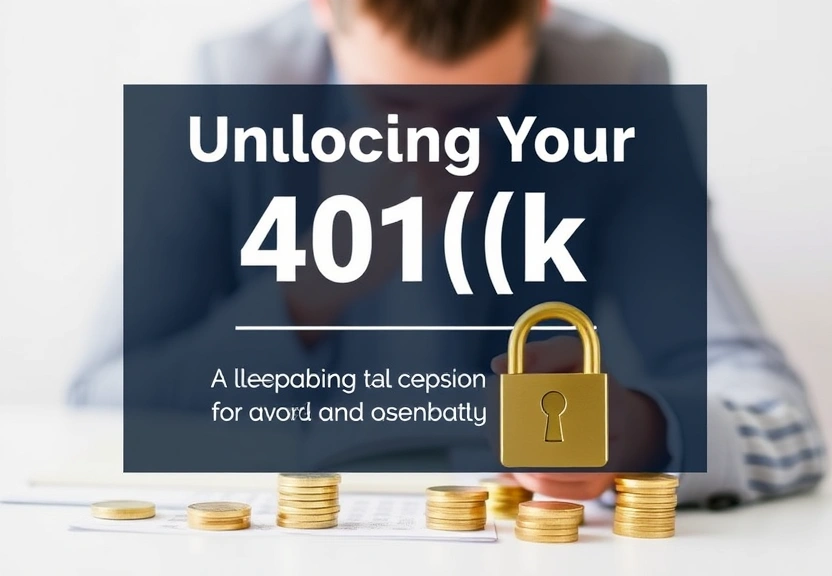Unlocking Your 401(k): Essential Insights for Boomers and Gen X to Avoid Risky Pitfalls
As the landscape of retirement planning continues to evolve, understanding how to effectively manage your 401(k) can mean the difference between financial security and uncertainty in your golden years. For Baby Boomers and Generation X, the stakes are particularly high. With many approaching retirement age, it’s crucial to assess your 401(k) investments critically, especially with the prevalence of target-date funds that may not align with your personal retirement goals.

This article delves into the essential insights around 401(k) investments, focusing on target-date funds and the potential risks they carry. We will explore the common pitfalls associated with these investment vehicles and provide actionable strategies to help you optimize your retirement savings while minimizing risks.
Understanding Target-Date Funds: Are They Right for You?
Target-date funds (TDFs) were designed to simplify retirement investing. They automatically adjust their asset allocation based on your expected retirement date, gradually shifting from riskier investments to more conservative ones as that date approaches. While this sounds appealing, many Boomers and Gen X investors may find that TDFs do not offer the customization needed for their unique financial situations.
The Allure of Target-Date Funds
Target-date funds have gained popularity for several reasons:
- Simplicity: They are a one-stop solution for those who may not have the time or expertise to manage their investments actively.
- Diversification: TDFs typically invest in a mix of stocks and bonds, offering built-in diversification.
- Automatic Rebalancing: As the target date approaches, the fund automatically adjusts its asset allocation to reduce risk.
Potential Misalignment with Personal Goals
Despite their benefits, target-date funds may not be the best choice for every investor. Here are a few reasons why:
- One-Size-Fits-All Approach: These funds are designed for a general audience and may not fit your specific needs or risk tolerance.
- Fees and Expenses: Many TDFs come with higher fees than other investment options, which can erode your savings over time.
- Market Volatility: Depending on the fund’s asset allocation, you may still be exposed to significant market risks as you near retirement.
Evaluating Your 401(k) Investment Strategy
Before making any changes to your 401(k), it’s essential to evaluate your current investment strategy thoroughly. Here are some critical steps to consider:
Assess Your Risk Tolerance
Your risk tolerance is crucial in determining the right mix of investments for your retirement plan. Factors influencing your risk tolerance include your age, financial situation, and investment goals. A financial advisor can help you assess your risk level and align your 401(k) investments accordingly.
Review Your Target-Date Fund Allocation
If you are currently invested in a target-date fund, take the time to review its allocation. Many funds may be overly conservative or aggressive, depending on your retirement timeline. Ensure that your fund aligns with your risk tolerance and retirement goals.
Explore Alternative Investment Options
Consider diversifying your portfolio beyond target-date funds. Here are some alternatives to explore:
- Index Funds: These funds typically have lower fees and can offer broad market exposure.
- Exchange-Traded Funds (ETFs): ETFs provide flexibility and can be traded like stocks while offering diversification.
- Individual Stocks and Bonds: If you have the expertise, consider building a custom portfolio that reflects your investment strategy.
Common 401(k) Pitfalls to Avoid
As you navigate your 401(k) investments, be aware of some common pitfalls that can jeopardize your retirement savings:
Neglecting to Rebalance
Over time, the asset allocation in your 401(k) can drift away from your intended strategy due to market fluctuations. Regularly rebalancing your portfolio helps ensure that your investments remain aligned with your goals.
Ignoring Fees
High fees can significantly impact your retirement savings. Be sure to review the expense ratios of your 401(k) investments and consider switching to lower-cost options if available.
Failing to Increase Contributions
As your salary increases, make it a habit to raise your 401(k) contributions. This can help maximize your retirement savings and take full advantage of employer matches if available.
Not Seeking Professional Guidance
Retirement planning can be complex, and seeking help from a financial advisor can provide valuable insights tailored to your situation. Don’t hesitate to consult with a professional who can guide you through the intricacies of managing your 401(k).
Frequently Asked Questions (FAQ)
1. What is a target-date fund?
A target-date fund is an investment vehicle that automatically adjusts its asset allocation based on a specified retirement date. It gradually becomes more conservative as the target date approaches.
2. Are target-date funds a good option for retirement planning?
While target-date funds can be convenient, they may not be suitable for everyone. It’s important to assess your individual risk tolerance and investment goals before choosing a TDF.
3. How often should I review my 401(k) investments?
It’s advisable to review your 401(k) investments at least annually or whenever there is a significant change in your financial situation or market conditions.
4. How can I reduce fees in my 401(k)?
To reduce fees, review the expense ratios of your investments, and consider switching to lower-cost index funds or ETFs if available in your plan.
5. Should I consult a financial advisor for my 401(k)?
Consulting a financial advisor can provide personalized insights and strategies for managing your 401(k) and ensuring that your retirement plan aligns with your goals.
Conclusion
Unlocking the full potential of your 401(k) requires a proactive approach to retirement planning. For Boomers and Gen X, understanding the nuances of target-date funds and recognizing the potential risks associated with them is vital. By evaluating your investment strategy, exploring alternatives, and avoiding common pitfalls, you can create a robust retirement plan that secures your financial future. Take control of your 401(k) today and ensure that your golden years are truly golden.
📰 Original Source
Este artigo foi baseado em informações de: https://www.marketwatch.com/story/whats-in-your-401-k-why-you-need-to-know-especially-boomers-and-generation-x-3c37c415?mod=mw_rss_topstories


